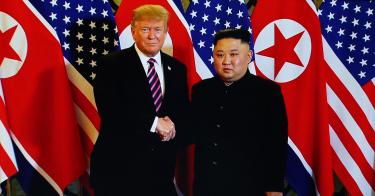The collapse of the second summit between President Donald Trump and North Korean dictator Kim Jong-un is being treated by many as a failure. In fact, the summit was a failure only if you believe that arriving at a bad agreement is the definition of success.
Under President Trump, U.S. policy toward North Korea has been beset by illusions. Fundamentally, the Trump administration has followed the same course as its predecessors, while believing it is taking radical new steps. Trump’s opponents, seeing an opportunity to criticize him, have happily bought into the administration’s delusion that it is doing something new.
In fact, until this second summit, nothing had changed. This administration, like many before it, is eager to reach a denuclearization agreement with North Korea. The North Koreans were keen on photo-ops and welcomed negotiations, after launching a missile or two to strengthen their position.
When the negotiations started, North Korea pledged – at the Singapore summit in June – to take helpful steps. It did nothing. Pyongyang continued its nuclear and missile programs unabated and declared it could not negotiate in the face of U.S. “hostile policy,” which includes anything that treats them as the murderous dictatorship they are.
In pursuit of a negotiated agreement, the United States minimized North Korea’s violations and offered a sweetener or two – like cancelling its military exercises with South Korea. The next step was for an agreement to be reached, and then to break down after the North Koreans cheat. After that, the cycle would begin again with the next U.S. administration.
The United States under President Trump was following this script. The only difference is that the Trump administration – unlike Clinton’s and George W. Bush’s – refused to drop U.S. sanctions in pursuit of an agreement that, as they repeatedly have done, the North Koreans would have violated.
I am astonished by the media reaction to this outcome. The prize for biased reporting goes to CNN , which argued that the entire U.S. outreach to North Korea was a “Hail Mary,” an “attempt at counter-programming,” and an effort to distract from Michael Cohen’s congressional testimony.
It takes me back to the 1990s, when the movie “Wag the Dog” fantasized a president – soon embodied in Bill Clinton – who faked a war in Albania to distract the nation from his sex scandals. The movie’s plot was idiotic, but at least the president in it was accused of faking a war.
Now, CNN is accusing Trump of faking a peace – and, worse, failing at it!
The only dog here is the shaggy dog of U.S. policy toward North Korea. The problem is this: the North Korean regime has been willing to invest vast sums and starve its population to build nuclear weapons and a missile program. The regime will not easily sell what it has paid in blood to acquire.
The North Korean regime can also see that dictators who give up their WMD programs – like Saddam Hussein and Muammar Gaddafi – are overthrown by the West. On the other hand, dictators who hang onto their WMDs – like Bashar Assad of Syria – survive and remain in power.
Ironically, the recent administration with the least bad record on North Korea was President Barack Obama’s. Its policy of “strategic patience” at least avoided the U.S. obsession with rushing to the negotiating table. Unfortunately, Obama’s policy also gave North Korea time to develop an intercontinental missile, so it too has to be judged a failure.
U.S. policy toward North Korea has been marked by its refusal to deploy the maximum amount of pressure in all areas short of war for an extended period of time. Pressure may result in denuclearization. It will at least make further North Korean nuclear advances even more costly.
This is an unglamorous approach, but it is better than rushing into negotiations. By walking away, Trump has preserved his option to apply pressure. Now he needs to take that option.
This piece originally appeared in Newsday



